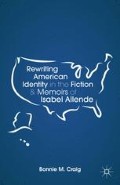Abstract
Isabel Allende’s memoirs and fiction between 1990 and 2010 are remarkable sites to explore American identity and belonging within nation.1 As Allende has shown, if nation is an invention, then reimagining the United States through literature is an intervention where the tool of writing affronts the existing power structure.2 Indeed, it is within “the ambit” (MIC 17) of her memoirs and fiction that Allende accommodates conflicting allegiances to political states and subjective desires about belonging. Crucially, Allende defines the “intangible space” (TSOOD 3) of affective engagement as “the one territory” (MIC 193) where she belongs. It has been my argument throughout this monograph that the intersection of multilayered spaces allows for new identities and a redefinition of American society itself.3 In doing so, as Allende engages with California’s past, present, and future, she contributes to a meaningful relationship between the imagined and physical site of the United States and the literary means of expression that the site produces.4
Access this chapter
Tax calculation will be finalised at checkout
Purchases are for personal use only
Preview
Unable to display preview. Download preview PDF.
Notes
Homi K. Bhabha, The Location of Culture (London, UK: Routledge, 2004), 2.
Jack Hicks, James D. Houston, Maxine Hong Kingson, and Al Young, “General Introduction,” in The Literature of California: Writings from the Golden State, vol. 1, ed. Jack Hicks, James D. Houston, Maxine Hong Kingston, and Al Young (Berkeley: University of California Press, 2000), 13.
Lois Parkinson Zamora, “The Usable Past: The Idea of History in Modern US and Latin American Fiction,” in Do the Americas Have a Common Literature, ed. Gustavo Pérez Firmat (Durham, NC: Duke University Press, 1990), 7.
Gloria Anzaldúa, Borderlands: The New Mestiza = La Frontera (San Francisco: Aunt Lute Books, 1987), 102. Mignolo also concludes with this quotation in The Idea of Latin America (Malden, MA: Blackwell Publishing, 2005), 162.
Donald E. Pease and Robyn Wiegman, “Futures,” in The Futures of American Studies, ed. Donald E. Pease and Robyn Wiegman (Durham, NC: Duke University Press, 2002), 37.
See Janice A. Radway, Kevin K. Gaines, Barry Shank, and Penny Von Eschen, “Introduction,” in American Studies: An Anthology (Chichester, UK: Wiley-Blackwell, 2009), 1–6.
Victoria Hesford and Lisa Diedrich, “Thinking Feminism in a Time of War,” in Feminist Time against Nation Time: Gender, Politics, and the Nation-State in an Age of Permanent War, ed. Victoria Hesford and Lisa Diedrich (Lanham, MD: Lexington Books, 2008), 4–5. Allende refers to Bachelet as “something new” and “very feminine” in an interview with Amy Goodman; see “Chilean Write Isabel Allende on Her Memoir, Her Family, Michelle Bachelet, Torture and Immigration,” Democracy Now, April 7, 2008, http://www.democracynow.org/2008/4/7/chilean_writer_isabel_alllende_on_her (Accessed September 2, 2011).
Isabel Allende, El cuaderno de Maya (Buenos Aires, Argentina: Sudamericana, 2011), 394.
International American Studies Association (IASA). International American Studies Association (IASA), http://www.iasaweb.org/conferences.html (Accessed October 15, 2011).
See International American Studies Association (IASA), “American Configurations Conference Program,” International American Studies Association, http://www.historia.uff.br/iasa2011/en/programming (Accessed October 16, 2011).
See Ricardo D. Salvatore, “Under Southern Eyes: Critical Hemispherism and American Studies,” in Transit Circle, Revista Brasileira de Estudos Americanos 7 (Nova Série 2008–2009) Looking North: Latin American Perspectives on the U.S. in International Perspective, ed. Paulo Knauss and Sonia Torres (Rio de Janeiro, Brazil: Contra Capa, 2008), 46–82.
Susan P. Castillo, Notes from the Periphery: Marginality in North American Literature and Culture (New York: Peter Lang, 1995), 24.
Copyright information
© 2013 Bonnie M. Craig
About this chapter
Cite this chapter
Craig, B.M. (2013). Conclusion. In: Rewriting American Identity in the Fiction and Memoirs of Isabel Allende. Palgrave Macmillan, New York. https://doi.org/10.1057/9781137337580_8
Download citation
DOI: https://doi.org/10.1057/9781137337580_8
Publisher Name: Palgrave Macmillan, New York
Print ISBN: 978-1-349-46462-3
Online ISBN: 978-1-137-33758-0
eBook Packages: Palgrave Literature CollectionLiterature, Cultural and Media Studies (R0)

